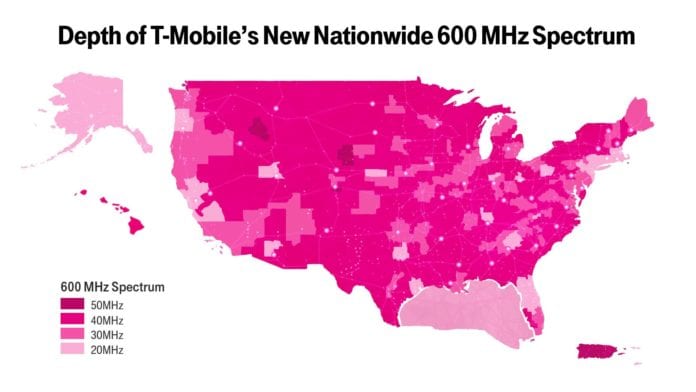T’Mo’s 600 MHz, along with Sprint’s 2.5 GHz, is major 5G value prop for proposed merger
In March last year, T-Mobile US spent around $8 billion in the 600 MHz incentive auction, winning 1,525 10 megahertz licenses covering 414 of the 428 partial economic areas covered in the auction. The carrier said it won 45% of the spectrum sold with an average depth of 31 megahertz and at least 10 megahertz covering all of the U.S. and Puerto Rico. A little more than a year later, the so-called “Un-carrier” says it has activated its low-band holdings in more than 900 cities in 32 states.
AS it relates to 5G, the carrier says the 600 MHz deployments are using “5G-ready equipment.” The carrier sells six smartphones that support 600 MHz. The operators also says it will deploy in hurricane-devastated Puerto Rico in the fall.
Company CTO Neville Ray said the hurricanes create “an opportunity to rebuild the network better than new—to rebuild with 5G-ready gear. We’re laying the foundation for the island to become a technology and innovation hub in the future.”
As it relates to the Sprint merger, which faces regulatory approval, the combined company would have low-, mid- and high-band spectrum holdings, which is seen as key to delivering on mobile 5G.
Last month at the MoffettNathanson Media and Communications Summit, Ray and CFO Braxton Carter talked up how a combination of the companies would serve to further domestic 5G leadership.
In dissecting the various synergies associated with the Sprint/T-Mo tie up, Ray called 5G a “really important dimension.” Noting accelerating 5G launch plans in the U.S. and APAC region, Ray said, “We’ve all seen some of those concerned very vocally placed into the market and into the media. There’s a real concern the U.S. will get left behind in the race to 5G capabilities.” He ticked off U.S. companies like Google, Facebook, Uber and Amazon that have dominated the internet economy.
“Why is this important? I think it’s a lot more than just about building networks. I think that is the first step. But it’s what comes after that. This is kind of a ‘build it and they will come’ story. As the new T-Mobile we can put down an incredible 5G network on a pace that nobody can do on their own. That will be years ahead of what any company can do on its own in the U.S. marketplace.” He said the result of a combined carrier would not only ensure the U.S. doesn’t get left behind, but maintains global leadership.

